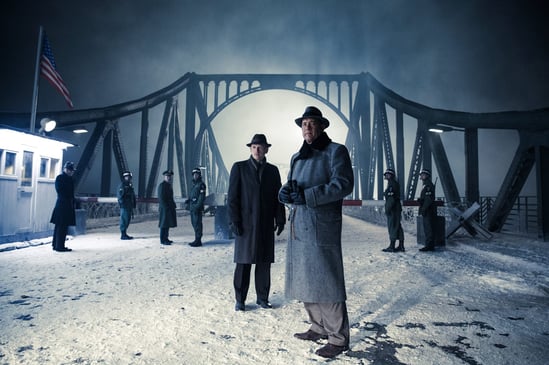Bridge of Spies: A Cinematic Symphony of Loyalty, Justice, and Humanity Amidst the Cold War
Cinemapedia
Steven Spielberg’s Bridge of Spies (2015) is a riveting historical drama that seamlessly blends espionage, legal ethics, and human empathy into a gripping narrative. Set against the backdrop of the Cold War, the film explores themes of loyalty, morality, and diplomacy through stunning visuals, an engaging story, a powerful score, and profound moral lessons.
A Meticulous Recreation of the Cold War Era
Spielberg’s mastery of visual storytelling shines through in Bridge of Spies. Cinematographer Janusz Kamiński brings the Cold War to life with a muted color palette, foggy streets, and bleak skies that perfectly capture the tense and oppressive atmosphere of the era. The visual contrast between the bustling streets of 1950s New York and the stark, crumbling landscapes of East Berlin highlights the ideological divide between the United States and the Soviet Union.
The attention to historical detail is impeccable, from the period-accurate costumes to the set designs that evoke the paranoia and unease of the time. The scenes on the Glienicke Bridge, where the pivotal prisoner exchange takes place, are visually striking and laden with symbolism, emphasizing the thin line between diplomacy and conflict.
Spielberg’s use of visual framing—placing characters behind bars, windows, or fences—reflects the themes of confinement and freedom that permeate the story. Every shot feels deliberate, reinforcing the narrative’s tension and emotional weight.
A Tale of Integrity and Diplomacy
At its core, Bridge of Spies is the story of James B. Donovan (Tom Hanks), an insurance lawyer tasked with defending Soviet spy Rudolf Abel (Mark Rylance) in an American court. Despite public outrage, Donovan’s unwavering commitment to justice and the rule of law drives him to ensure that Abel receives a fair trial. This act of integrity leads Donovan into the murky world of Cold War espionage, as he is later recruited to negotiate a prisoner exchange between the U.S. and the Soviet Union.
The screenplay, written by Matt Charman and polished by the Coen Brothers, masterfully balances legal drama, espionage, and human emotion. The dialogue is sharp and nuanced, capturing the moral dilemmas faced by the characters. The story unfolds at a measured pace, allowing the tension to build naturally as Donovan navigates political pressures and personal threats to uphold his principles.
Mark Rylance’s portrayal of Rudolf Abel is understated yet deeply affecting, earning him an Academy Award for Best Supporting Actor. His calm demeanor and cryptic lines, such as “Would it help?”, add layers of complexity to his character, making him more than just a spy. Tom Hanks delivers a commanding performance as Donovan, embodying the lawyer’s courage, compassion, and unyielding belief in justice.
A Subtle Yet Powerful Undercurrent
The score, composed by Thomas Newman, is both understated and evocative, perfectly complementing the film’s tone. While less grandiose than some of Spielberg’s previous collaborations with John Williams, Newman’s music enhances the emotional and thematic depth of the story. The somber strings and subtle piano melodies mirror the film’s tension and humanity, creating an atmosphere that is both haunting and hopeful.
The use of silence in key moments is equally impactful. Spielberg often lets the visuals and performances speak for themselves, heightening the audience’s immersion in the narrative. The restrained use of music underscores the gravity of the situations without overshadowing the story’s emotional core.
Justice, Humanity, and the Power of Diplomacy
Bridge of Spies is a film that delves deep into the moral complexities of loyalty, justice, and humanity. Through Donovan’s character, the film highlights the importance of standing by one’s principles, even in the face of adversity. His decision to defend Abel, despite public condemnation, is a testament to the idea that justice must prevail, even for those deemed enemies.
The film also underscores the power of diplomacy and empathy in resolving conflicts. Donovan’s ability to see beyond nationalistic biases and treat Abel with respect and dignity is a stark contrast to the hostility and paranoia of the Cold War. The story serves as a reminder that compassion and understanding can bridge even the widest divides.
The prisoner exchange on the Glienicke Bridge is a powerful moment of moral triumph, as Donovan’s efforts ensure the safe return of American pilot Francis Gary Powers and American student Frederic Pryor. The film leaves viewers with a sense of hope, emphasizing that individual actions rooted in integrity and humanity can have a profound impact.
A Masterpiece of Historical Drama
Bridge of Spies is a testament to Steven Spielberg’s storytelling prowess. Its meticulous visuals, compelling narrative, nuanced performances, and subtle score come together to create a film that is both entertaining and thought-provoking. It is a reminder of the power of justice, diplomacy, and human empathy in the face of fear and division.
For those who appreciate historical dramas with a strong moral compass, Bridge of Spies is an essential watch—a film that resonates deeply in a world still grappling with the complexities of conflict and coexistence.


